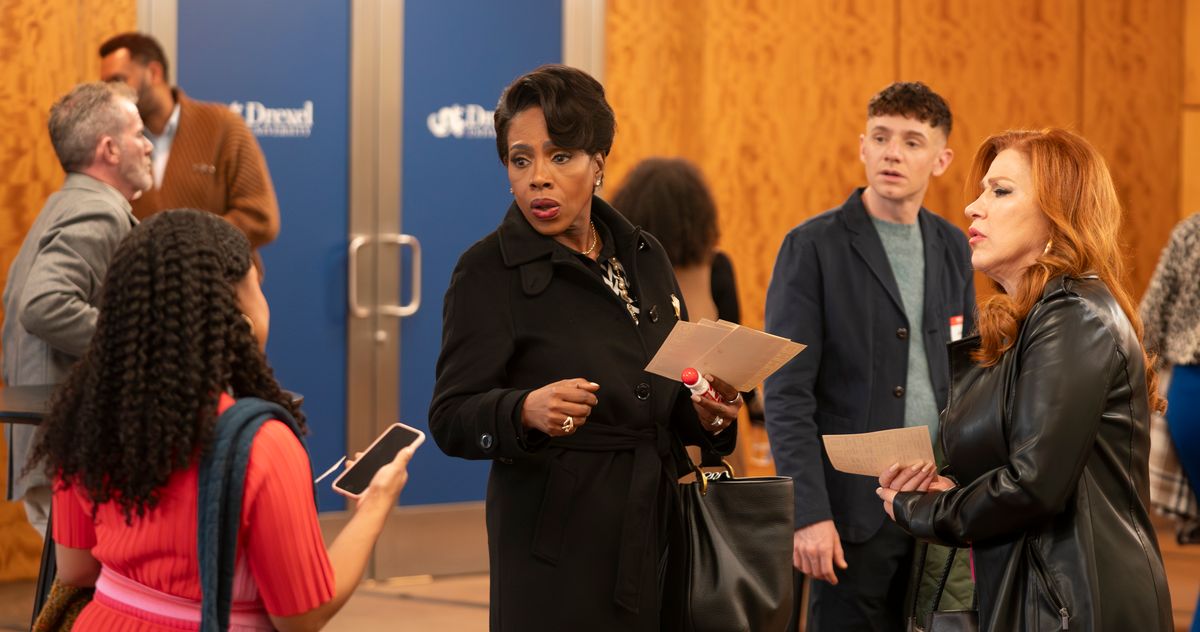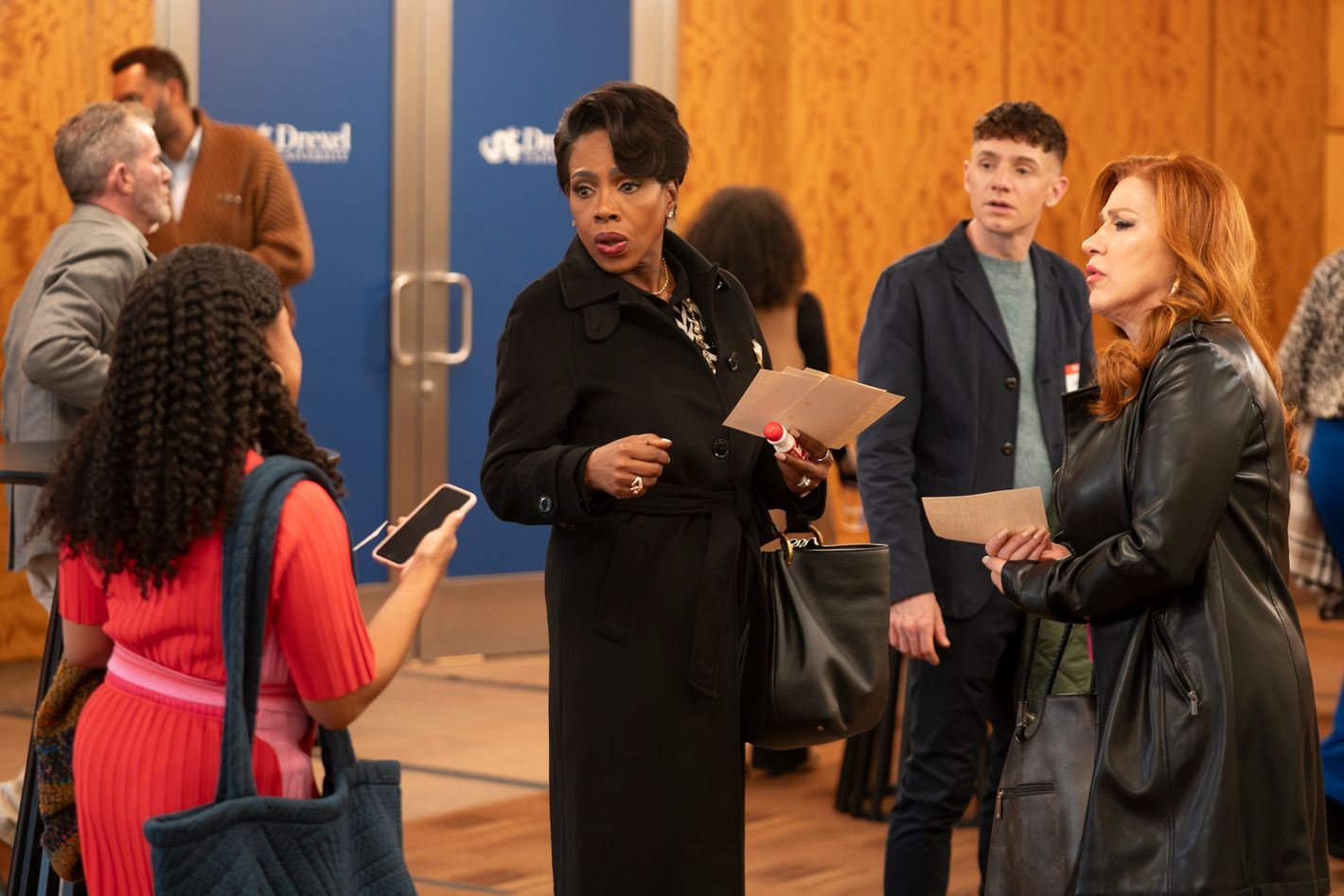Abbott Elementary Recap: District Bingo
Nothing dampens Valentine’s Day quite like crashing out over a miscommunicated “I love you.”


Given the state of education in this country, like Jacob, I would probably cry too if I saw a student like RJ suddenly illuminate in the classroom. It’s heartbreaking knowing that so many of our children, who are arguably the most vulnerable demographic, lack a solid foundation for intellectual success. I can link numerous studies showing historically low test scores and overall public discontent surrounding education, but there are only so many ways to say that the kids need our help. Educators know this more than anyone — in a bleak sub-Reddit for teachers, one user described the current system as a machine that’s been “held together by duct tape for so long.” Another offered this telling quote from The Handmaid’s Tale: “Nothing changes instantaneously: in a gradually heating bathtub, you’d be boiled to death before you knew it.”
It’s a very dark topic with serious impending consequences. (Wwhat happens when an entire generation of people who, for all intents and purposes, can barely read, are tasked with being our next health-care workers, government leaders, and educators?) But as usual, Abbott handles it with care while pointing the audience toward asking the right questions. Obviously, Abbott’s main focus is the teacher’s point of view, emphasizing, and often glorifying, the fact that these characters do so much with the little that they have. While their efforts are sweet, kindness and earnest optimism alone can’t change material conditions, something the show is acutely aware of. When shifting focus to the lack of funding from the district, Abbott successfully maintains its acclaimed feel-good factor while still guiding viewers toward asking questions like: Why are our teachers reaching into their own pockets to provide supplies? And: Why are our children sharing textbooks when we live in one of the richest countries on the planet? And, without a sanctimoniously heavy hand, the show answers these questions by highlighting the lack of monetary investment from political decision-makers.
Without sufficient funding, there isn’t much the teachers can do to improve conditions for their students beyond bending over backward where they see fit, which is unfair to them and the kids. Take Jacob, for example; setting his sights on finding the perfect extracurricular activity for RJ not only left him feeling more overwhelmed than before, knowing he couldn’t provide the same energy for everyone, but others also took note of the special treatment. Jacob’s anxiety escalates after two students confront him about wanting a curated educational experience like RJ, because they, too, have issues at home and would like a special club in their honor as well. It’s another example of the responsibility of teachers to engage their students in a time where attention spans are almost nonexistent yet, as another school complained to the board, they’re still working with history books from the civil rights era. But, since it’s the same day as the district’s big budget meeting, Jacob assures them he’ll try to figure something out.
Once at the meeting, Barbara distributes a silly game of bingo she came up with, containing boxes for “district platitudes,” with corporate phrases like “We’ll do our best to accommodate” and “Abbott certainties” with situations like “Melissa threatens violence.” It’s ironic because the episode is definitely another classically formulaic installment of Abbott. A great drinking game would be to take a sip every time Jacob explains Black culture to a Black person or gives an impassioned speech. This isn’t to say the episode was boring, just hilariously predictable, something I welcome in the world of sitcoms. I still love every time Barbara helps Janine with “something silly,” which was, of course, another square on the bingo card. This time, Barbara steps in when Janine sends herself into a tizzy after Gregory casually ends a voice note by saying “I love you.”
Gregory’s possible declaration of love hits especially hard as it’s Valentine’s Day, and the couple already agreed to keep the day low-key. At the budget meeting, Gregory goes on a smoothie run only to find out that the menu temporarily assigned love-themed titles to all their offerings. When Gregory sends an audio message explaining the confusion, he trails off at the end with an “I love you.” Since the couple has never said that to each other before, and saying it in a voice note is strangely casual for Gregory, Janine characteristically overthinks the situation. Initially, Barbara believes that maybe he was saying, “I love food,” but upon further thought (Gregory loves food as much as he loves spontaneity), she helps Janine get to the bottom of it. Once Gregory returns with the smoothies, one of which is named the I Love You, Barbara, and Janine realize that he was probably just saying the name of the smoothie. Janine’s disappointment radiates and she becomes visibly prickly with Gregory every time he says he loves something.
Meanwhile, the district meeting brings back some familiar faces, with Ava’s nemesis and soror Crystal, played by Tatyana Ali, and Janine’s old co-worker Manny, played by Josh Segarra. Crystal, who is the principal of Liberty Elementary, immediately taunts Ava, showing off her prime time slot for pleading her case for funding in front of the school board. Ava is unfazed; after a year of exercising her “black belt in blackmail,” she knows Abbott has enough resources, and she believes that her time learning the language of the district and going out of her way to present her Ed-Talk will put her in the school board’s good graces. Beyond that, despite Crystal’s ideal time slot, Manny pulls Ava aside to inform her that the superintendent put aside a chunk of money for Abbott, telling her she could “sleepwalk” through her presentation and “wake up with a bag.” But once she watches Crystal put her all into her presentation and still get denied, the new, altruistic side of Ava reluctantly bubbles to the surface.
Jacob wants to use the extra money to create more clubs for all the students, but Melissa points out how unrealistic it is for someone to handle teaching and overseeing that many extracurriculars. As he bonds (sort of) with the other teachers about their lack of funding, he finds out that one of the schools brought in a counselor to help their students deal with their inadequate resources. Jacob ignores the teachers’ words about the counselor being the metaphorical equivalent of putting a Band-Aid on a bullet wound (saying that they asked how the children feel about the hole in the ceiling instead of fixing the ceiling spoke volumes); he thinks this could be a solution for Abbott. The other teachers agree that their students could benefit from individualized attention from a professional counselor, but they doubt Ava would approve of something so expensive. Jacob takes a conniving page from his boss’s playbook and, without explaining his true intentions, convinces Ava that since they have already secured the money, she should allow him to speak to the board.
Always a step ahead, Ava knows that allowing Jacob to do whatever he’s planning will most likely result in the district reneging on their promise (the board is stern about speakers swiftly making their point, something that isn’t Jacob’s strong suit), and encourages him to speak. It’s a clear method of self-sabotage and an easy way to even the playing field without actually getting her hands dirty. Jacob fumbles through a long-winded introduction, eventually summoning the courage to ask for a counselor, a request that seems superfluous to those who don’t even have the basics. Surprisingly, the board grants his wish, ruining Ava’s plan. To correct this, she steps up to the mic and adds an addendum: The rest of the money should be divided between the three other Title I schools that the board denied. It’s a Hail Mary move from Ava, one that no one, especially Crystal, could’ve predicted. She thanks Ava, and the sorors exchange passive-aggressive pleasantries until Crystal ups the ante by facetiously noting how interesting it is that Abbott already had certain resources without help from the district, before giving Ava the kiss of death through a parting peck on the cheek.
Ava, knowing Crystal is onto her and her blackmail, grabs Jacob by the neck, whispering in his ear that it was an “interesting” choice he made to lie to her and now she just so happens to be looking for a new person to destroy to restore order. Manny then warns the Abbott staff that the stunt they pulled pissed off the district, adding that they should be on their best behavior because “they’re about to be on your ass.” Although the threat of future retribution looms, Abbott walks out of the budget day with a few small wins for the students of the district, something Gregory “loves.” Janine snaps at this proclamation, tired of hearing all the things he loves that aren’t her. Gregory finally straight-up asks what’s wrong, and Janine plays him the audio message, explaining she knows he was talking about the drink but it still brought up feelings. Gregory stops her there, saying he may have let the statement slip out by accident; he wasn’t ordering a smoothie. He was going to wait until dinner, but he just couldn’t wait. With everything on the table, Janine adorably sends him a voice note of her own, finally, saying she loves him too. I hope they have a great time at Bone Town!
Teacher’s Notes
• Finally, the silliest lines of the episode:
A fellow teacher at the district interacting with the Abbott staff: “What are you looking at, SpongeBob? Can it, Tommy Pickles!” I love how the teachers have such a bad reputation with the rest of the district, with everyone calling them weird.
Jacob: “So much can happen in a year … haven’t you seen Rent?”
Ava, trying her best to one-up Crystal saying she’s “clocked in at the locked-in factory”: “I’m locked in at the clock factory, and guess what? There’s no key!”








